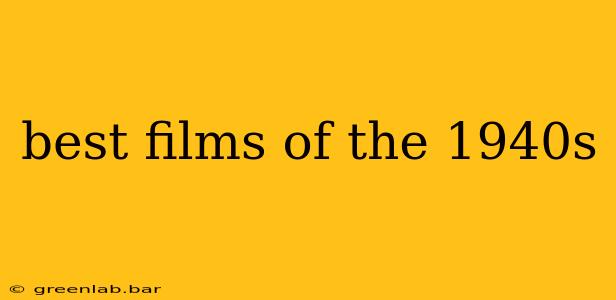The 1940s stand as a pivotal decade in cinematic history, a period brimming with innovation, artistic expression, and unforgettable storytelling. World War II cast a long shadow, influencing themes and production, yet the era also witnessed a flourishing of genres and groundbreaking filmmaking techniques. This exploration delves into some of the best films of the 1940s, showcasing the diversity and brilliance of this golden age of cinema. We'll consider critical acclaim, cultural impact, and enduring legacy to compile this list, acknowledging that "best" is subjective and invites diverse opinions.
Genre-Defining Classics:
Film Noir: A Shadowy Reflection of Society
The 1940s witnessed the birth and rise of film noir, a genre characterized by its cynical tone, morally ambiguous characters, and stark visual style. These films often explored themes of corruption, betrayal, and disillusionment, reflecting the anxieties of the post-war era.
- Casablanca (1942): More than just a romance, Casablanca is a masterpiece of storytelling, perfectly capturing the atmosphere of wartime Morocco and exploring themes of sacrifice, love, and duty. Its iconic status is undeniable.
- The Maltese Falcon (1941): A cornerstone of the film noir genre, The Maltese Falcon features Humphrey Bogart's unforgettable portrayal of Sam Spade, a cynical detective navigating a web of deceit and danger.
- Double Indemnity (1944): Billy Wilder's masterpiece is a chilling exploration of greed, lust, and murder, showcasing the genre's dark underbelly and masterful storytelling.
Screwball Comedies: Wit and Whimsy Amidst Uncertainty
Despite the global turmoil, the 1940s also saw the continuation of the screwball comedy tradition, offering audiences lighthearted escapism amidst the seriousness of the times. These films often featured witty dialogue, fast-paced action, and unconventional romantic pairings.
- The Philadelphia Story (1940): A sparkling romantic comedy featuring Katharine Hepburn at her finest, The Philadelphia Story is a witty and charming tale of love, family, and societal expectations.
- His Girl Friday (1940): Howard Hawks' masterpiece is a fast-paced and hilarious romantic comedy with brilliant dialogue and unforgettable performances by Cary Grant and Rosalind Russell.
Beyond Genres: Masterpieces of Narrative and Technique
The 1940s offered much beyond genre conventions. Several films pushed cinematic boundaries, demonstrating the power of the medium to explore complex themes and human experiences.
Social Commentary and Realism:
- Citizen Kane (1941): Orson Welles' groundbreaking film is considered by many to be one of the greatest films ever made. Its innovative narrative structure and cinematic techniques revolutionized filmmaking. It’s a powerful exploration of ambition, power, and the elusive nature of truth.
- The Grapes of Wrath (1940): John Ford's adaptation of John Steinbeck's novel powerfully portrays the struggles of the Oklahoma Dust Bowl migrants during the Great Depression. Its realistic portrayal of poverty and hardship remains deeply affecting.
Musicals and Technicolor Spectacles:
- The Wizard of Oz (1939): While technically released at the end of the 1930s, its impact continued strongly throughout the 40s. A timeless classic combining fantasy, adventure, and memorable music.
- Yankee Doodle Dandy (1942): A vibrant biographical musical celebrating the life and work of George M. Cohan, showcasing the power of patriotic sentiment during wartime.
Conclusion: A Legacy of Excellence
The best films of the 1940s represent a remarkable period in cinema, reflecting the complexities of the era while simultaneously pushing the boundaries of artistic expression. From the shadowy allure of film noir to the witty charm of screwball comedies and the groundbreaking techniques of cinematic masters, these films continue to captivate and inspire audiences today. This list is merely a starting point; explore further and discover your own favorites amongst the rich tapestry of 1940s cinema.

